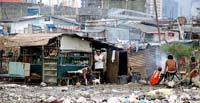Philippine slums a hotbed for the kidney black market

When things go bad in the Baseco dockside shantytown on Manila Bay, the men sell their blood.
When things get worse, they sell their kidneys.
Baseco, is but one of the hotspots in the Philippines where the desperately poor sell their organs, which has given The Philippines a reputation for human organ trafficking.
Other poverty sticken areas like Calauag, Gumaca, Lopez, and Sariaya, are home to hundreds of farmers, tricycle drivers, uneducated or unemployed men who had sold a kidney suggested experts at the 23rd International Congress of The Transplantation Society in Vancouver recently.
The experts estimated that on an average about 20 Canadians seek organs for transplant on the black market in countries such as India, China and the Philippines each year.
In doing so, they may be risking their own lives, they said.
Transplant specialists are concerned about exploitation of the world’s most impoverished people who donate organs to get money.
Dr. Graham Sher, of Canadian Blood Services, said the most recent data he has seen shows 215 Canadians sought transplants outside Canada from 1995 to 2004.
It is not known how many of these clandestine transplant operations are being done in the Philippines, where kidney vendors in places like Baseco - Southeast Asia’s best-known living donor community, with local officials estimating that some 3,000 of the slum’s 50,000 residents have sold a kidney. - get a measly US$1,500 or roughly P125,000 for an organ.
Comparatively the asking price in the US starts at $30,000 while kidney vendors get as much as $10,000 to $20,000 in Israel; $7,500 in Turkey, $6,000 in Brazil and $2,700 in Moldova and Romania, some reports said.
Although most organ transplant tourism has been illegal in The Philippines since 2008, the country is struggling to eradicate the problem said officials in Manila.
The Philippines Department of Health (DOH) has issued two administrative orders to fight organ trafficking, in particular the selling of kidneys to foreign patients.
It has issued tighter revised rules on donating and transplanting organs from living persons through Administrative Order 2010-0018, which seeks to ensure that organ donations are “voluntary and truly altruistic.”
The new administrative order reiterates the ban imposed on foreigners from receiving organs from living Filipino non-related donors, and categorically prohibits health professionals from engaging in the kidney trade.
Health Secretary Esperanza Cabral says, “we issued the order because we wanted to make sure that nobody is exploited during the transplantation, and that organs are donated only for altruistic purposes. We want to make sure that illegal traffic of organs that has victimized many of our countrymen for many years will not be repeated. Hopefully the international medical community will recognize that our country is indeed serious in curtailing illegal organ donation.”
The DOH orders confirm that kidney transplantation is not a legal part of medical tourism in the country. In 2005, The World Health Organization identified the Philippines as one of the global hotspots for organ trafficking, along with China, Pakistan, Egypt and Colombia.
In the last decade the Philippines gained an international reputation as a hub for the illegal traffic in human organs from living donors, with some hospitals catering for wealthy foreign patients requiring kidney transplants.
Following criticisms that her administration was promoting transplant tourism, in 2008 president Gloria Macapagal-Arroyo ordered a total ban on all kidney transplant to foreigners. Prior to the 2008 ban, 800 foreigners each year had illegal kidney transplants. In 2008 the country also signed an international declaration on organ trafficking and transplant tourism, but it seems that a handful of doctors still participate in organ transplant tourism, which is more lucrative than ever after many countries successfully killed the business.
The new order sets up a system for the allocation, harvesting and transplantation of organs from deceased donors to Filipinos to provide people who need kidneys with the kidneys they need as 9000 Filipinos develop permanent kidney failure each year.
Jerry Chapman of The Transplantation Society (TTS), an international association of transplant experts, believes that these guidelines are important for organ transplantation in the Philippines.
At the conference in Vancouver, Dr. Francis Delmonico, a transplant surgeon pointed out the dangers as evidenced by University of Toronto researchers in a study led by Dr. Ramesh Prasad, which revealed that new kidneys obtained through such means can result in far higher surgical complications, infections, transplant failure and even death.
The Prasad study looked at the outcomes of 22 Canadians who purchased a new kidney and transplant in countries throughout Asia and the Middle East. One-third of all the patients transplanted outside of Canada required immediate hospitalization on their return to Canada, primarily for serious infections. Another third required eventual hospital admission. Two patients required repeat transplants and nearly 40 per cent had drug-resistant infections. Another 14 per cent got tuberculosis.
Despite countries making laws to ban or restrict transplant tourism, transplant specialists are worried that with an increasing number of desperate patients seeking organs outside North America, countries around the world have to do more to increase the number of donor organs.
Dr. Luc Noel of the World Health Organization says, “Transplantation has become such a routine procedure that we all expect to get an organ if we need one.”
In Canada, medical tourists who procure underground organs in other countries pay out of pocket and provincial governments in Canada will pay for the complications arising from transplant tourism. Canada’s doctors are the first in the world to develop an official policy in which they have the authority to refuse to treat transplant patients who ignore their medical opinion and insist on becoming medical tourists.






